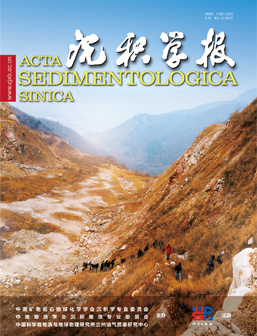Characteristics and geological significance of the tempestites in the Lower Ordovician Fenxiang Formation, Yuanchengkou area, Upper Yangtze Platform
doi: 10.14027/j.issn.1000-0550.2023.098
- Received Date: 2023-04-24
- Available Online: 2023-10-11
-
Key words:
- Upper Yangtze Platform /
- Sichuan Basin /
- The storm rock /
- Points township group /
- The ordovician
Abstract: In order to study the sedimentary characteristics and geological significance of the typical tempestites in the Lower Ordovician Fenxiang Formation in the chengkou area of the Upper Yangtze Basin. Via detailed field survey and microscopic section analysis, the sedimentary sequence of the tempestites and mode of the Fenxiang Formation are established, which reveal the geological significance. The results show that the tempestites sedimentary structures of Fenxiang Formation in Chengkou area mainly include bottom scour structure, storm gravel layer, grain sequence bedding and mound cross-bedding. At the same time, five kinds of tempestites sedimentary sequences were identified: Sequence I was mainly composed of bottom erosion, gravel layer (A), grain sequence (B) and parallel bedding segment (C), and mainly developed in the platform margin facies; Sequence II consists of grain sequence (B) and parallel bedding segment (C), which developed in the platform margin facies near the slope. Sequence III is composed of bottom erosion and gravel layer (A), grain sequence layer (B), parallel bedding (C) and argillaceous limestone segment (E), which are mainly deposited in the fore-platform slope facies zone. Sequence Ⅳ mainly consists of grain sequence segment (B) and argillaceous micrite segment (E), which are mainly deposited in the lower the fore-platform slope. Sequence V is composed of grain sequence (B), mound bedding segment (D) and argillaceous micrite segment (E), which mainly developed in the deepwater shelf. The development of tempestites indicates that the upper Yangtze platform was located in the low latitude area in the Early Ordovician, and the Chengkou area was dominated by platform margin and slope deposits. The bottom-up sedimentary environment evolved into platform margin → platform front slope → deep water shelf. The development of tempestites indicates that the Upper Yangtze platform was near the equator at low latitude during the Ordovician period. The sedimentary environment of Fenxiang Formation in the Chengkou area of the Upper Yangtze Platform is the platform margin zone. Combined with the regional geological background, it is considered that there are geological conditions for developing large-scale platform margin shoals in the chengkou area of the Yangtze Platform..
| Citation: | Characteristics and geological significance of the tempestites in the Lower Ordovician Fenxiang Formation, Yuanchengkou area, Upper Yangtze Platform[J]. Acta Sedimentologica Sinica. doi: 10.14027/j.issn.1000-0550.2023.098 |






 DownLoad:
DownLoad: